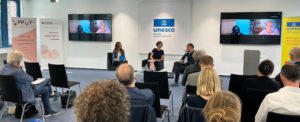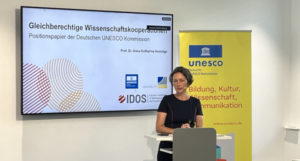On 20 June 2024, the German Commission for UNESCO (DUK) adopted the position paper ‘Equitable International Research Cooperation’ presented by the DUK Science Committee. As Chair of the Expert Committee, Prof Dr Anna-Katharina Hornidge, Director of IDOS, played a key role in drafting the paper and led the process.

Researchers from the network of the joint project ‘Forced Migration and Refugee Studies: Networking and Knowledge Transfer (FFVT)’ also contributed extensively to the paper by organising a workshop on equitable international research cooperation in October 2023 together with the DUK. The results of the workshop, which brought together representatives of national and international science and science funding institutions, were incorporated into the position paper and further refined in subsequent discussions in the expert committee. The position paper was presented to the scientific community, science funding institutions and science policy-makers at a launch event organised jointly by the FFVT team at IDOS and the DUK on 19 August.
In his welcoming address, Dr Roman Luckscheiter, Secretary-General of the German Commission for UNESCO, emphasised the importance of the position paper by pointing out that equal knowledge cooperation should already exist in theory, but is not yet sufficiently implemented in practice. The position paper provides concrete impulses on how implementation can be organised. Anna-Katharina Hornidge presented the paper to the participating representatives of the German scientific community.
Against the backdrop of growing global challenges, international knowledge cooperation is becoming increasingly important. Yet, 80% of knowledge cooperation worldwide is still characterised by a national orientation. This is problematic, as the individual states’ references to scientific facts are increasingly perceived as hegemonic dominance, particularly at a multilateral level. Recognising these challenges, the paper names 12 impulses that represent concrete proposals on how the conditions for and practice of German scientific cooperation can be shaped differently.

For example, Anna-Katharina Hornidge referred to the need to change the framework conditions for science funding and argued that international organisations such as the United Nations should be used more as intermediaries to promote multinational science. In addition, practical knowledge cooperation must be reorganised in order to ensure equitability in terms of roles and modes of cooperation as well as in the publication process. In a discussion moderated by Carolin Riethmüller, Dr Peggy Oti-Boateng, Executive Director of the African Academy of Sciences, Roula El-Rifai, Senior Programme Specialist at the International Development Research Centre (IDRC), Dr Thomas Hesse, Secretary General a.i. of the Alexander von Humboldt Foundation, and Prof. Dr Anna-Katharina Hornidge then commented on the potential of the paper at international level.
Peggy Oti-Boateng welcomed the position paper, which follows on from a number of other important publications in this field and signals Germany’s willingness and readiness to transform established forms of research cooperation. In addition, Roula El-Rifai emphasised the need for international cooperation and greater localisation of knowledge production in order to tackle global challenges together and develop effective, local and context-specific solutions, including structural and capacity-building measures. Thomas Hesse underlined that the international community could not afford not to include the knowledge, skills and creativity of partners on an equal footing. The event ended with questions and feedback from the plenary.

Schreibe einen Kommentar